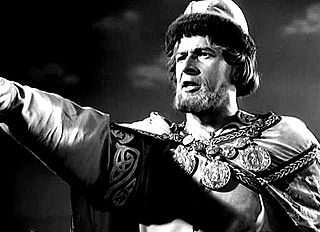
Yevgeny Aleksandrovich Mravinsky was a Russian conductor, pianist, and music pedagogue; he was a professor at Leningrad State Conservatory.

Gennady Nikolayevich Rozhdestvensky, CBE was a Soviet and Russian conductor.

Yuri Abramovich Bashmet is a Russian conductor, violinist, and violist.

David Geringas is a Lithuanian cellist and conductor who studied under Mstislav Rostropovich. In 1970 he won the gold medal at the International Tchaikovsky Competition. He also plays the baryton, a rare instrument associated with music of Joseph Haydn.

Alexander Nevsky is the score composed by Sergei Prokofiev for Sergei Eisenstein's 1938 film Alexander Nevsky. The subject of the film is the 13th century incursion of the knights of the Livonian Order into the territory of the Novgorod Republic, their capture of the city of Pskov, the summoning of Prince Alexander Nevsky to the defense of Rus', and his subsequent victory over the crusaders in 1242. The majority of the score's song texts were written by the poet Vladimir Lugovskoy.
Ivan the Terrible, Op. 116, is the score composed by Sergei Prokofiev for Sergei Eisenstein's film Ivan the Terrible (1942–45) and its sequel (1946), the first two parts of an incomplete trilogy. The project was Prokofiev's second collaboration with Eisenstein, the first being the popular Aleksandr Nevskiy (1938). The majority of the non-liturgical song texts were written by Vladimir Lugovskoy, who collaborated with Prokofiev on the texts for Aleksandr Nevskiy.

Christian Thielemann is a German conductor. He is currently chief conductor of the Staatskapelle Dresden and the director of the Salzburg Easter Festival.
The Berlin Radio Symphony Orchestra is a German symphony orchestra based in Berlin. In Berlin, the orchestra gives concerts at the Konzerthaus Berlin and at the Berliner Philharmonie. The orchestra has also given concerts in other German cities such as Aschaffenburg, Essen, Halle, Oldenburg, and Wiesbaden.

Vladimir Mikhailovich Jurowski is a Russian and British conductor. He is the son of conductor Michail Jurowski, and grandson of Soviet film music composer Vladimir Michailovich Jurowski.

Alexander Gordon Shelley is an Echo Music Prize-winning English conductor. He is currently music director of the National Arts Centre Orchestra in Ottawa, as well as principal associate conductor of the Royal Philharmonic Orchestra. Shelley was the unanimous winner of the 2005 Leeds Conductors Competition. From 2009 to 2017 he was chief conductor of the Nuremberg Symphony Orchestra. He is also artistic director of the Deutsche Kammerphilharmonie Bremen's Echo and Deutsche Gründerpreis winning "Zukunftslabor".
Ion Marin is a Romanian-Austrian conductor. He is internationally renowned both in operatic and symphonic domains.
Konstantin Saradzhev was an Armenian conductor and violinist. He was an advocate of new Russian music, and conducted a number of premieres of works by Pyotr Ilyich Tchaikovsky, Modest Mussorgsky, Igor Stravinsky, Sergei Prokofiev, Nikolai Myaskovsky, Dmitri Shostakovich, and Aram Khachaturian. His son Konstantin Konstantinovich Saradzhev was a noted bell ringer and musical theorist.

Alexander Ivashkin, was a Russian cellist, writer, academic and conductor.
The Kharkiv Philharmonic Society is a leading musical organization in Ukraine, promoting classical music, contemporary music, and Ukrainian folk music.

Mateusz Krzysztof Maksymilian Molęda is a German-Polish conductor.

Heiko Mathias Förster is a German conductor. Most notable for conducting the Munich Symphony Orchestra from 1999 to 2006, since 2014, he has been the chief conductor of the Ostrava-based Janáček Philharmonic Orchestra.
Eberhard Kloke is a German conductor and composer.
Walter Schartner was a German conductor, composer and Hochschullehrer. In 1946, he was appointed Generalmusikdirektor in Halle and as such he directed the Orchestra of the Halle Opera House. In 1949/50, he was chief conductor of the Philharmonisches Staatsorchester Halle.

Eugen Szenkar was a Hungarian-born German-Brazilian conductor who made an international career in Austria, Germany, Russia, and Brazil. He promoted the stage works of Bela Bartók and other contemporary music at the Oper Frankfurt, the Cologne Opera, where he conducted the world premiere of The Miraculous Mandarin, and in Berlin. He conducted all of the symphonies by Gustav Mahler.
Albert Bittner was a German conductor and Generalmusikdirektor.












